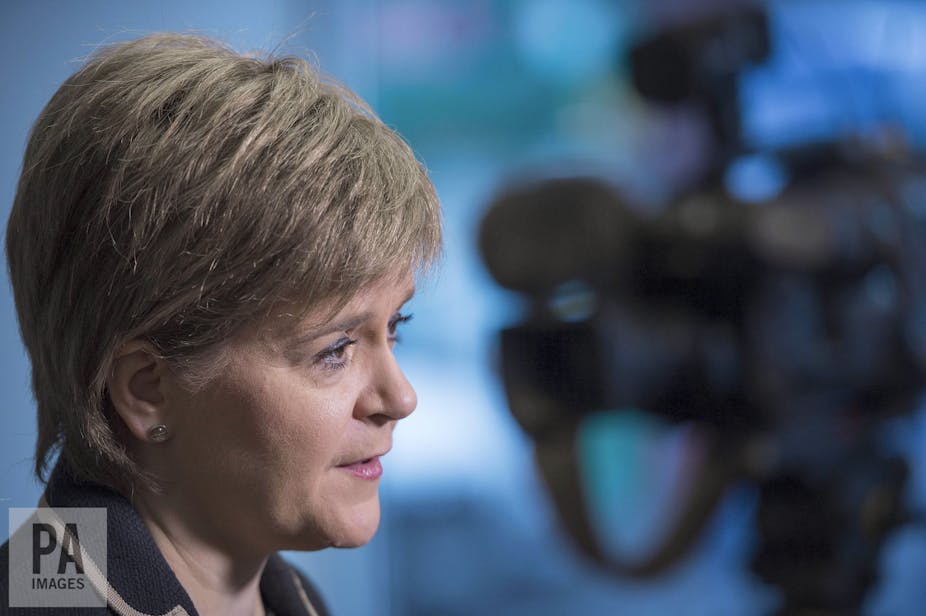Whatever the rights and wrongs of Theresa May’s speech about Brexit, the UK prime minister appears to have increased the chances of a second Scottish independence referendum. Nicola Sturgeon, the Scottish first minister, had previously indicated there would be another referendum unless either the UK or Scotland could stay in the European single market, and neither now looks possible.
In an interview after May’s speech, Sturgeon agreed it was “all but inevitable” that a second referendum would now take place, and that the plan to leave the single market brought it “undoubtedly closer”. Despite some reports that lukewarm polling is making certain nationalists wary of another referendum, other campaigners have speculated it could come early next year – or after Brexit is completed a couple of years down the line.
If Scotland is now heading for another referendum in the near future, the question for the Yes side is how best to proceed. Last time, arguments like the economic fallout and losing the pound helped deliver a 55% victory for the No side – thanks in particular to older voters. To overturn this, psychologists like myself would advise Sturgeon and her colleagues to study the political upsets of 2016. That means the Brexit victory, plus another unexpected result currently bearing fruit – the election of soon-to-be President Donald Trump.
Decisions, decisions
Both results can be explained by psychological research into decision-making and voters’ biases. We know that for complex and emotional decisions, people tend to be led by intuition rather than weighing the available evidence – intuitive decision making is guided by cognitive rule of thumb techniques called heuristics. Elections and referendums are very much in this category, but few more so than Brexit and Trump.
Immigration is a very emotive topic and featured heavily in both debates. Both were also complicated by contradictory information plus scandals in the case of the presidential election and, in the case of the EU referendum, a subject few people really understand. Voters probably relied heavily on their intuition in both cases.

This will have been driven by certain classic heuristics, such as “take the best”. When voters are making a choice between two outcomes, they compare these against a small number of cues from campaigners such as slogans, suggested policies and so forth. One obvious cue was “making America/Britain great again”, for example. In the case of Brexit, others included things like “do you want control over your borders?” and “leaving the EU will free up money for the NHS”.
Voters rank cues from both sides from most to least valid, and choose their side based on the first piece of information that allows them to favour one outcome over the other. In the EU referendum, for example, voters seem to have processed the “take back control” cue and this enabled them to decide to vote Brexit. Thus the decision was made without evaluating all the available evidence.
When indviduals reach a decision, they often get into a mindset where they will disregard conflicting information and see confirming information as being very positive. This is known as confirmation bias, and you’ll see it particularly on social media during any emotive election.
We saw it in the EU referendum when pro-Brexit voters reacted to expert advice that leaving the EU might damage the UK’s economy by apparently agreeing with Leave campaigner Michael Gove’s claim that they had had enough of experts. This allowed them to confirm their pre-decisional choice and disregard contradictory information, protecting their intuitive decision from appeals to reason.
But why did this process lead voters to choose Brexit and Trump? The human mind doesn’t have much cognitive capacity so it avoids wasting time unnecessarily. As a result, intuitive decision-making favours information that is simple. Politicians who are masters of simplistic messages and continually repeat words will be favoured – last year, Trump and the British Leave campaign did better in this regard.
Lessons for Yes Scotland
The lesson for a future Yes Scotland campaign is that it needs to create an emotive argument around independence, since this will promote an environment more conducive to voters relying on intuition. For instance, the campaign could focus on arguments such as “Britain dragged us out of Europe” and “decisions made south of the border have had a negative impact on Scotland’s economy”.
In many ways, this would amount to mirroring the No campaign of 2014. The No campaign was arguably blessed with the best emotive “cards” last time, such as the economy and the EU, which encouraged voters looking for short-cuts to the “right” choice to favour it. Now those cards may well be in the hands of the Yes side. At the same time, it might want to play to certain emotive strengths it chose to play down last time, such as Scotland’s culture and history.
The Yes side will also need to appeal to the intuition of the electorate by using simplistic language, promoting simple cues that allow independence to be favoured over the status quo. An example would be pushing a message that Scotland has no voice in the UK, using Brexit as the prime exhibit. Sturgeon already demonstrated an ability to do this when the SNP won almost every seat in Scotland in the 2015 UK election by driving home the failings of the Westminster parties.
If the Yes campaign seizes the initiative with the right messaging early and gets some luck along the way, confirmation bias will also set in. Then pro-independence statistics and information would be seen as very positive by many voters while messages from the other side would get disregarded or skewed to suit the Yes side’s agenda.
The 2016 victors have demonstrated how to win a political campaign when the opinion polls are against you. In particular, it will be the ultimate irony if Sturgeon and her fellow campaigners end up winning Scottish independence having learned from the unionist Brexiteers how to cross the finishing line.

